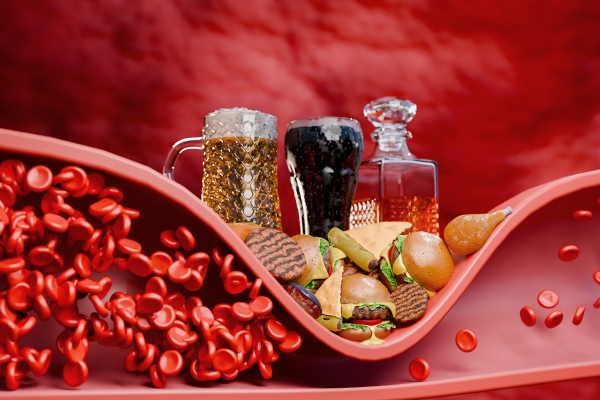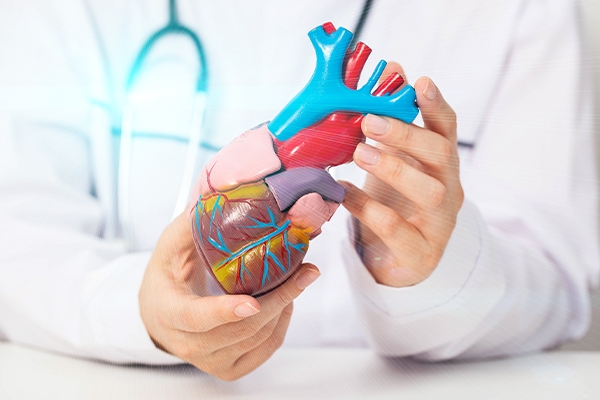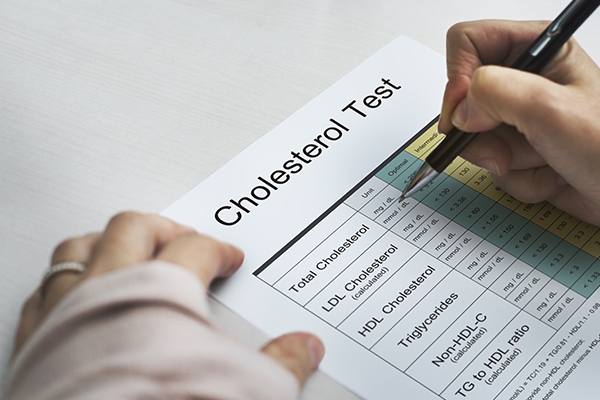Cholesterol and Lurking Complications

“I thought it was just ordinary fatigue,” said Mr. Darto (56 years old) while rubbing his chest. “It turned out to be a heart attack. The doctor said my cholesterol was very high.”
Mr. Darto’s story is not the only one. Many of us live our lives as usual, feeling healthy and active, and never suspect that cholesterol is secretly accumulating inside our bodies and forming a time bomb.
Read more: When Should Cholesterol Be Checked?
High cholesterol does not show clear symptoms. It does not cause fever or coughing and often goes unnoticed until something big and serious happens—like a heart attack or stroke.
Let’s discuss together why high cholesterol should be a concern for all of us.
What is cholesterol?
Cholesterol is a solid fat substance found in all cells in the body. It has many essential roles in the body. For example, it helps the body make hormones and vitamin D. The digestive system also produces cholesterol to help produce bile.
The body produces cholesterol naturally, but it also comes from our foods, especially those high in saturated and trans fats.
However, when cholesterol levels get too high in the blood, it can become a serious health threat.
What is high cholesterol?
High cholesterol or hypercholesterolemia occurs when the blood's lipid (fats) levels exceed normal limits.
Too high a cholesterol level in the blood (more than 200 mg/dL is considered high) is unhealthy because it can cause blockages in the arteries. High cholesterol also damages organs that do not receive enough blood because of clogged arteries.
Bad cholesterol (LDL) is the most dangerous type because it causes hardened cholesterol deposits (plaque) to build up in the blood vessels. This makes it harder for your blood to flow, putting you at risk for stroke or heart attack, depending on the location of the blockage.
Uncontrolled high cholesterol can be dangerous to the body because it causes various severe health complications.

Here are some dangerous diseases that can be triggered by high cholesterol:
1. Coronary heart disease
One of the principal risks of high cholesterol is coronary heart disease, which can lead to death from a heart attack.
Coronary heart disease occurs due to the buildup of cholesterol or plaque on the walls of the heart's arteries. This plaque narrows and hardens the blood vessels, a condition called atherosclerosis.
If the plaque ruptures and completely blocks blood flow, a heart attack can occur. Early symptoms, such as angina (chest pain), are often ignored.
Chest pain symptoms sometimes appear like heartburn symptoms so that they are not further noticed. In addition to chest pain, other symptoms usually arise, such as cold sweats, shortness of breath, nausea, and dizziness.
2. Stroke
When a blockage occurs in the blood vessels leading to the brain, the flow of oxygen and nutrients is cut off. This is what causes an ischemic stroke. High cholesterol is one of the main risk factors for this condition.
Read more: Can Young Adults Have Strokes?
3. Peripheral vascular disease
High cholesterol harms the heart and brain and triggers peripheral artery disease (PAD), a narrowing or blockage of the blood vessels in the legs and feet. This causes pain when walking, muscle cramps, and slow-healing wounds.
If left untreated, PAD can lead to severe circulatory problems throughout the body, including the heart and brain.
4. Diabetes
Diabetes can disrupt the balance of cholesterol levels in the body, especially between HDL ("good" cholesterol) and LDL ("bad" cholesterol). People with diabetes tend to have LDL particles that stick to artery walls more easily and cause damage to blood vessels.
Glucose (blood sugar) can attach to lipoproteins—particles that carry cholesterol and triglycerides throughout the body. When LDL is coated with glucose, the particles can stay in the bloodstream longer, causing plaque in the arteries.
5. High blood pressure (hypertension)
High cholesterol triggers inflammation and the release of certain hormones that cause blood vessels to narrow. This is known as "endothelial dysfunction".
Blood pressure increases because the heart is forced to work harder to pump blood through narrowed blood vessels.
This is called hypertension.
Read more: What You to Need Know About Hypertension.
6. Gallstones
The digestive system needs cholesterol to produce bile. However, if cholesterol levels in the blood exceed normal limits, the risk of gallstones will increase.
Gallstones that block or infect the gallbladder can produce symptoms that include upper abdominal pain, nausea and vomiting, fever, jaundice, pale stools, dark urine, decreased appetite, and itchy skin.
Symptoms of high cholesterol
High cholesterol is often called the silent killer because it doesn’t show symptoms until too late. That’s why it’s critical to have your cholesterol checked regularly.
However, in some cases, such as familial hypercholesterolemia, you may be able to identify signs of high cholesterol, such as
- lumps on the knees, knuckles, or elbows;
- swelling in the Achilles tendon;
- yellow spots around the eyelids;
- white/gray rings around the corneas.
But remember, most people don’t notice anything until complications occur.
How to know and prevent it

The only way to know your cholesterol level is to have regular blood tests. Start at age 20 and have them every 4–6 years, or more often if you have risk factors.
To prevent high cholesterol:
- eat foods low in saturated fat (reduce fried foods, coconut milk, red meat);
- increase fiber (vegetables, fruits, whole grains);
- be physically active for at least 30 minutes a day;
- quit smoking and limit alcohol;
- manage stress and get enough sleep.
Don't wait until your body gives you a warning in the form of a heart attack or stroke. Lifestyle changes and medication can prevent, control, and even reduce high cholesterol.
Check your cholesterol today

Protect your heart, brain, and body from hidden dangers. Check your cholesterol levels regularly and start a healthy lifestyle. If you have risk factors, consult a doctor at the GWS Medika Clinic, a health clinic in Jakarta.
Because health that looks good on the outside is not necessarily good on the inside.
About GWS Medika
GWS Medika now has seven clinics strategically positioned around Jakarta, consisting of five primary clinics and two medical centers in Blok M and Permata Hijau.
These two medical centers provide comprehensive health services, from general practitioner consultations to specialists in cardiology, radiology, and dentistry.
Supported by modern facilities, GWS Medika provides various diagnostic services, including heart examinations with treadmills, USG, X-rays, and dental panoramic X-rays.
GWS Medika also provides vaccinations and medical check-ups (MCU) for individuals and companies, IV treatment, home service, and office visits throughout our clinic network.
Skin and aesthetic health services are available, especially at the GWS Medika Blok M Medical Center.
GWS Medika, a health clinic in Jakarta, is committed to providing comfortable, reliable, and easily accessible health services, both at the clinic and directly to your location.



